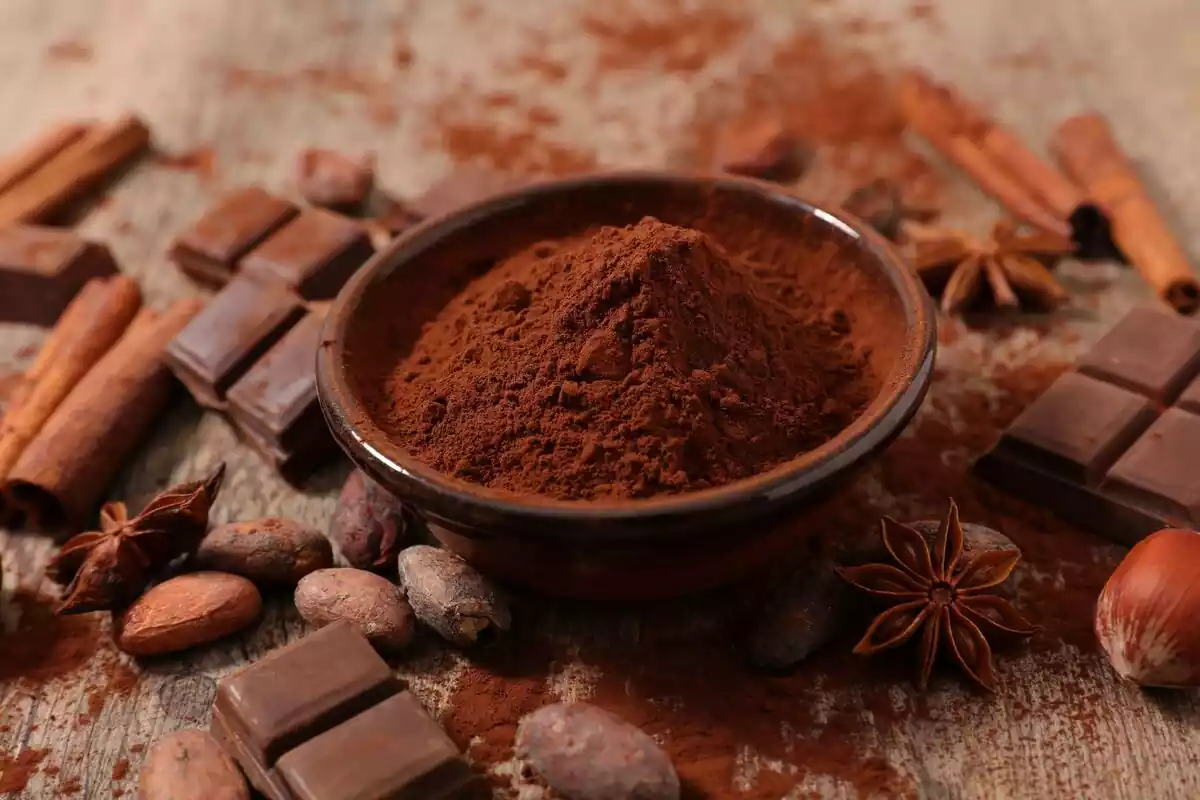Cocoa is famous for its role in the production of chocolate. It contains significant amounts of sugar and fat, so it is important to consume it in moderation. However, cocoa powder contains compounds that can be beneficial to health.
Nevertheless, how many of these benefits are scientifically proven? Throughout this article, we will discover what cocoa is and its properties and advantages that are backed by scientific evidence.
What is cocoa?
Cocoa is a bean or seed from theTheobroma cacao tree. When this seed is dried and fermented, the solid beans, butter, and fat can be extracted from the cocoa.
Cocoa beans are also known as cocoa pod and are characterized by having a thick, rough and leathery rind. Inside it is filled with a sweet, gelatinous pulp. Its acid taste is similar to that of lemonade. This pulp covers the seeds (it has between 30 and 50) of the cocoa bean. When they are fresh, they have a pale lavender color and are soft.
During the harvest, the pods open. Then the seeds are extracted and placed where they can ferment. Due to the accumulation of heat in the fermentation process, the cocoa beans lose their violet tone and turn dark brown, which provides the characteristic color of chocolate.
Some products like cocoa powder or chocolate are elaborated from the solid beans that are inside the cocoa. With those products, they produce sweet foods like cocoa butter, cocoa nibs, and chocolate cake.
Cocoa plants grow in a very limited geographical area to the north and south of Ecuador. The history of cocoa is ancient. It was first used by the Mayan civilization of Central America and its production is limited to these areas, nowadays almost 70% of the world's cocoa crop is grown in West Africa.
Cocoa is world famous for being the basis for chocolate products, and it contains high amounts of sugar and fat. But unsweetened cocoa powder and dark chocolate, which contain more than 70% cocoa, are being studied for their potential health benefits.
Cacao benefits
Below we will find 9 health benefits of cocoa that are supported by the scientific community.
1. Rich in polyphenols
Polyphenols are natural antioxidants found in foods such as cocoa, fruits, vegetables, tea or wine.
These antioxidants are linked to numerous health benefits, including reduced inflammation, improved blood flow, and consequent decreases in blood pressure, cholesterol levels, and blood sugar levels.
Cocoa is one of the primary sources of polyphenols, specifically flavonoids, which are distinguished by their powerful antioxidant and anti-inflammatory effects.
However, when cocoa is processed and heated, some of its beneficial properties related to polyphenols may be lost. Although cocoa is rich in polyphenols, not all cocoa-containing products provide the same benefits.

2. Improves brain function
Several studies have found that the polyphenols that cocoa contains may reduce the risk of neurodegenerative diseases by improving brain function and blood flow.
Flavonoids have the ability to cross the blood-brain barrier and participate in the biochemical pathways that produce some of the neurons and molecules that are important for the proper functioning of our brain.
Flavonoids also influence the production of nitric oxide, which relaxes the muscles of blood vessels, improving blood flow and supply to the brain.
Some studies suggest that daily intake of flavonoids, such as pure cocoa, may improve mental performance in people with or without cognitive impairment.
These studies reveal an essential role of cocoa in our brain health, as well as possible positive effects on some neurodegenerative diseases. However, there is still much more research to be done.
3. Lowers blood pressure
Cocoa, both powder and dark chocolate, can help lower blood pressure by improving nitric oxide levels.
As stated above, nitric oxide can improve blood vessel function and reduce blood pressure.
4. Protects your heart
In addition to lowering blood pressure, research suggests that cocoa possesses properties that may reduce the risk of heart attack and stroke by relaxing and dilating the arteries.
More discoveries reveal the possibility that cocoa can reduce bad cholesterol levels as it has an anticoagulant effect, improves blood sugar levels and reduces inflammation.
These results suggest that regular consumption of small amounts of cocoa powder or dark chocolate containing more than 70-80% cocoa concentrations may have benefits for the heart.
5. Helps regulate insulin levels
Excessive consumption of chocolate is not good for controlling blood sugar levels, but pure cocoa does have some anti-diabetic effects.
Laboratory studies indicate that cocoa flavanols may slow the digestion and absorption of carbohydrates in the intestine, improve insulin secretion, reduce inflammation, and stimulate the uptake of blood sugar into the muscle.
6. Can help people with asthma
Another of the possible benefits of cocoa is related to respiratory problems such as asthma. Its high content of antiasthmatic compounds such as theobromine and theophylline can be very beneficial in reducing asthma symptoms.
Theobromine is a caffeine-like compound that can relieve a cough, while theophylline promotes lung dilation, airway relaxation, and decreased inflammation.
However, we should point out that most of these findings have been discovered through animal testing. Therefore, although this is helpful for future research, it is too early to determine how cocoa can be used in asthma treatment.
7. Promotes weight loss
It may seem paradoxical, but the consumption of cocoa can help control body weight.
Research suggests that cocoa powders or chocolates which are high in cocoa levels can help regulate energy use, reduce appetite and inflammation, and increase fat oxidation and fullness feeling.
8. Improves mood
In addition to the positive impact of cocoa on brain functioning (described above), its effect on the brain has also been related to an improvement in mood.
The positive effects on mood may also be due to the action of cocoa flavonols. These molecules promote the conversion of tryptophan into serotonin, a natural mood stabilizer.
9. Benefits for skin and teeth
Cocoa powder contains several compounds with antibacterial, enzyme inhibitor and immunostimulant properties that can contribute to the maintenance of good oral health.
Also, despite popular opinion, cocoa is not a cause of acne. Its cause is all the compounds and sugars that are mixed with cocoa in industrial preparations.
In fact, studies have found that the polyphenols in pure cocoa have significant benefits for the skin. Prolonged cocoa intake contributes to sun protection and blood circulation of the skin and improves surface texture and skin hydration.
References
Ding, E. L., Hutfless, S. M., Ding, X. & Girotra, S. (2006). Chocolate and Prevention of Cardiovascular Disease: A Systematic Review. Nutrition & Metabolism, 3:2.
Ferri, C., Desideri, G., Ferri, L., Proietti, I., Di Agostino, S., Martella, L., Mai, F., Di Giosia, P. & Grassi, D. (2015). Cocoa, blood pressure, and cardiovascular health. Journal of Agricultural and Food Chemistry, 63(45): 9901–9909.
Kim, J., Kim, J., Shim, J., Lee, C. Y., Lee, K. W., Lee, H. J. (2014). Cocoa phytochemicals: Recent advances in molecular mechanisms on health. Critical Reviews in Food Science and Nutrition, 54(11): 1458–1472.
